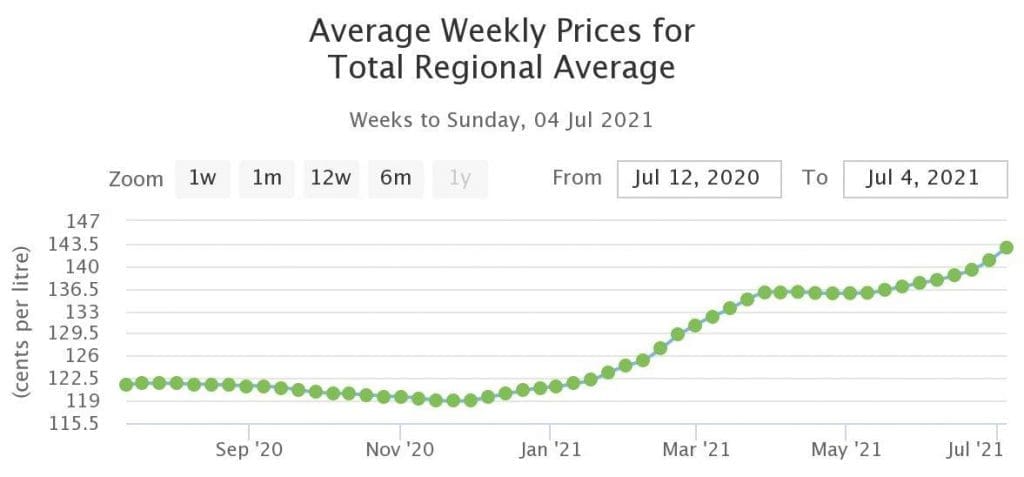
DIESEL fuel prices have continued to surge in recent months, in response to COVID-related cuts in production by major world fuel oil suppliers.
The Australian Institute of Petroleum’s latest monthly report shows retail diesel prices in regional (non-metropolitan) areas of Australia last week averaged 142.9c/litre, a rise of 5c/l over the past month and 21c/l higher than this time last year.
Average wholesale price for diesel last week was 131.6c/litre, its highest level since March 2020.
Prices varied from state to state, with Queensland regional retail diesel the cheapest, averaging 141.1c/l, and the Northern Territory the highest, at 178.1c/l. New South Wales prices in regional areas last week averaged 143c/l, and in Victoria, 141.8c/l.
As part of its quarterly report monitoring the prices, costs and profits relating to the supply of fuel products in the petroleum industry in Australia, the Australian Competition and Consumer Commission said cuts in oil production by the OPEC cartel and other big producers, combined with a pick-up in global fuel demand, had led to higher fuel prices in Australia’s five largest capital cities in the last quarter. While its report focusses on petrol rather than diesel, the broader trends apply across both fuels.
“What we are experiencing in Australia is a flow-on effect of higher international crude oil and refined petrol prices,” ACCC chair Rod Sims said.
Over the last 40 years, international crude oil prices in inflation-adjusted terms were on average around US$61 per barrel. In March 2021, monthly average crude oil prices were above this long-term average for the first time since December 2019.
“The OPEC cartel controls a huge amount of global oil supply,” Mr Sims said.
“Its agreements to restrict supply means higher crude oil prices which largely influence refined petrol and diesel prices. The higher price of Mogas 95 (the benchmark for refined regular unleaded petrol in the Asia-Pacific region), means we are paying more for petrol at the bowser,” he said.
Demand for fuel remains below pre-pandemic levels
Demand for petrol in the March quarter remained below pre-pandemic levels, with petrol sales volumes across Australia declining slightly between December and March quarters.
In the second half of 2020 national fuel sales partially recovered when some COVID-19 restrictions were eased. However lockdowns in Brisbane, Perth, Melbourne and parts of Sydney, and floods in New South Wales and Queensland, contributed to sales declining slightly in the March quarter, Mr Sims said.
Average sales volume for the quarter were around 7pc lower than quarterly average sales volumes in calendar year 2019, but 7pc higher than quarterly average sales volumes in calendar year 2020.
Unlike petrol prices, which fluctuate wildly within a weekly cycle, there is no retail discounting cycle (i.e. sawtooth pattern) for diesel, as only 25pc of diesel is sold through retail outlets and most of this goes to contract or fuel card customers rather than private motorists, the Australian Institute of Petroleum AIP said.
Most diesel is sold in bulk to commercial/industrial/agricultural customers on long-term contract, and such contracts are subject to rigorous competition under regular market tenders.
The Singapore benchmark price of diesel (Gasoil 10ppm sulfur) was the key diesel price benchmark for Australia, AIP said.
Crude oil is purchased in US dollars, meaning that changes in the value of the A$ against the US$ have a direct impact on the relative price of crude oil in Australian dollar terms. Therefore, changes in the A$ /US$ exchange rate must be taken into account when looking at movements in crude oil price, the AIP said.
Post-COVID demand on the rise
The International Energy Agency’s latest monthly report suggests global oil demand is set to return to pre-pandemic levels by the end of 2022, rising by 5.4 million barrels this year, and a further 3.1 million barrels in 2022.
Global refinery throughput in 2021 is expected to recover half of the 7.4 million barrels lost in 2020, due to COVID’s impact on demand.
Source – ACCC.

HAVE YOUR SAY